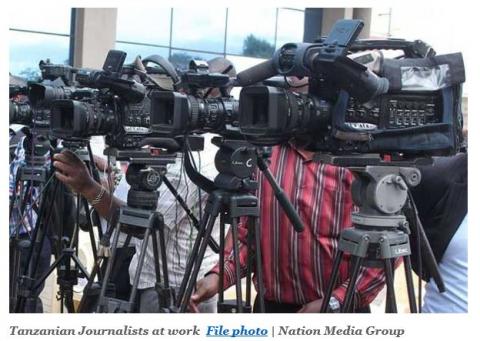DRACONIAN MEDIA LAWS WORRY TANZANIAN JOURNALISTS
 Submitted by jbimokola on
Submitted by jbimokola on

A Tanzanian journalist, Jabir Idrissa has termed the newly passed Electronic and Postal Communications (Online Content) Regulations as a big setback to press freedom saying it is meant to hide a lot of information from the public.
“The electronic law is draconian, it constrains the freedom of expression contrary to the Republic of Tanzania’s constitution, Article 18 which grants Tanzanians the right to freedom of expression.” Jabir Idrissa, the Chief Editor of MwanaHalisi, a Tanzania weekly newspaper said in a telephone interview.
According to the regulations, bloggers are required to not only register and pay a three-year license and an annual fee of $900 to operate a personal blog in the country but also to report the anticipated content of their blogs. Failure to register and pay will lead to a risk of fine, jail, or both.
These regulations have joined the long list of laws related to online content in Tanzania that threaten citizens’ constitutionally guaranteed rights to freedom of opinion and expression. The Online Content Regulations which was signed on 13th March, 2018 grants extensive powers to the Tanzanian Communications Regulatory Authority (TCRA) to control freedom of expression rights of Tanzanians online. As a result, many online news sites have been closed.
The Electronic and Postal Communications (Online Content) Regulations also mandate, among other things, that they provide a right of reply to aggrieved parties, and edit controversial user comments and online discussions which is used as a tool to harass and persecute users who are critical of the government. For instance, Part II Section 4 (b) of the law empowers the Communications regulator to order removal of “prohibited content.” It also introduces some clear restrictions like prohibition of online anonymity. Anyone who publishes online content (on blogs, forums, websites, YouTube and even social media) are required to know the identity of everyone who comments on their platform.
The founder of Jamii Forums , Maxence Melo accused the Tanzania Communications Regulatory Authority (TCRA) of targeting whistle-blowers' forums when drafting regulations
in a telephone interview to the Citizen newspaper. Celebrating the annual World Press day on 3rd May, 2018, the Media Council of Tanzania representative, Paulo Malimbo told the Citizen said laws suppressing media freedom should be amended to comply with the Country’s constitution.
The regulation has also heightened concerns among observers like Reporters Without Borders (RSF) revealing that it exerts pressure on journalists and stifles freedom of expression.
“If the authorities had wanted to destroy Tanzania’s blogosphere, they couldn’t have found a better way to do it,” said Arnaud Froger, the head of RSF’s Africa desk to RSF.
“The government must amend this law, which will otherwise mean the end of online information,” he continued.
The Government of Tanzania has existing laws that tamper on Journalist’s freedom to press and some of these include, The Cybercrimes Act 2015, The Statistics Act, 2013 , The Media Services Act, 2015 and The Access to Information Act, 2015. All these laws have resulted into creating an unfriendly environment for the Tanzanian media, where the constitutional guarantees for freedom of speech does not necessarily equate with freedom of the press.
“The Cyber-crime Act which has been condemned to be harsh for social media users, Tanzania passed two draconian laws, the Media Service Act and the Statistics Act which have put media freedom on trials. More than 10 people, including university students and opposition politicians, have been charged in different court cases over the past year for insulting the president via social networking platforms,” said Elias Msuya, a journalist with the Mwanachi Newspaper.
Another Mwananchi journalist, Peter Erias said: “The Medias Services Act is very strict on journalist to the extent that they can be jailed for any information that the authorities perceive as seditious.”
When we contacted the office of the Tanzania Communications Regulatory Authority (TCRA), the officials declined to comment on the subject. But the government of Tanzania argues that these laws are needed to facilitate access to information and regulate the media sector.
Salome Kitomari, the Media Institute of Southern Africa-Tanzania Chapter (Misa-Tan) chairperson in a telephone interview said about four newspapers, three radio stations and four T.V stations have been closed down since President John Pombe Magufuli came into power and the print media is not allowed to display pictures of the President on front pages.
“It’s like untouchable to write a story on the wrong doings of those in power,” Salome Kitomari said.
Thophil Makunga, the chairman of the Tanzania Editors Forum, told ACME that Magufuli’s regime has been the toughest on the media, compared to past presidents Julius Nyerere, Hassan Mwinyi, Mkapa and Kikwete.
- Log in to post comments
- 1652 reads
